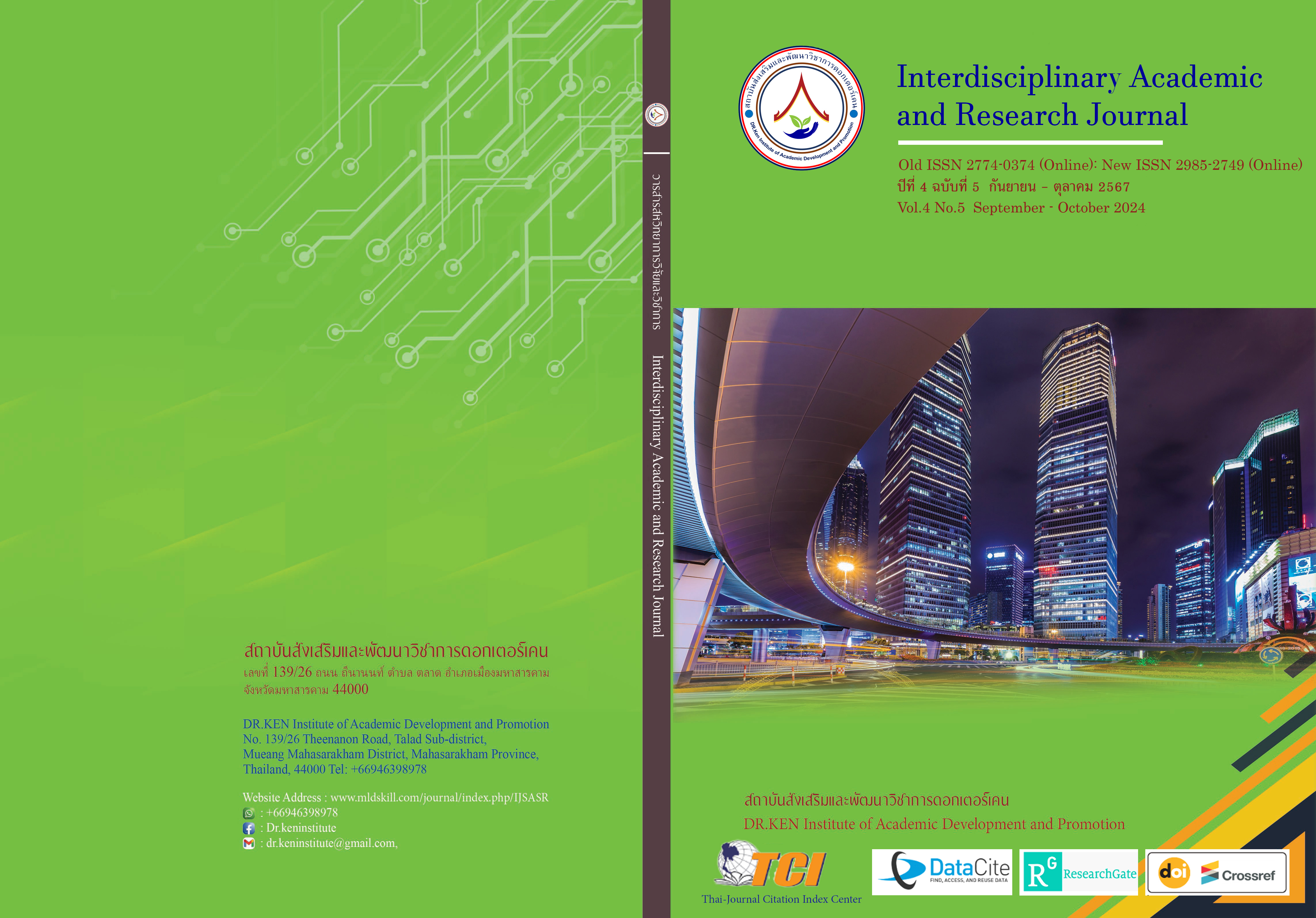Educational Institution Administration using the Principles of Good Governance by Educational Institution Administrators under the Jurisdiction of the Udon Thani Primary Educational Service Area Office 3
DOI:
https://doi.org/10.60027/iarj.2024.276065Keywords:
Principles of Good Governance; , Educational Institution AdministrationAbstract
Background and Aims: Successful human resource management. It is critical to rely on good management principles. Both the public and private sectors can use it for administration purposes. Good governance is a principle that is widely applied in modern administration. The objectives of this research are to 1) study educational institution administration using Dhamma principles; and governance of educational institution administrators. Udon Thani Primary Educational Service Area Office 3. 2) Compare educational institution administration based on good governance principles for administrators. The Udon Thani Primary Educational Service Area Office 3 is responsible for classifying educational levels. Work experience and size of the educational institution. 3) Research guidelines for developing educational institution administration based on the principles of good governance for educational institution administrators. Udon Thani Primary Educational Service Area Office 3.
Methodology: This study used a sample of 341 school administrators and teachers. The sample size was determined using Krejci and Morgan's table and randomly assigned to groups. The research tool was a 5-point rating scale questionnaire. The consistency index ranged between 0.80 and 1.00, and the overall reliability of the questionnaire was 0.87. Statistics used for data analysis include frequency, percentage, mean, standard deviation, T-value, and F-value tests.
Results: The study's findings revealed that: (1) Educational institution administrators apply good governance principles. Under the jurisdiction of the Udon Thani Primary Educational Service Area Office 3, the overall level is high. (2) Comparing opinions on school administration among administrators based on good governance principles. Udon Thani Primary Educational Service Area Office Area 3 is responsible for categorizing students by educational level. Work experience and the size of educational institutions It was discovered that the overall and individual aspects were not different. (3) Guidelines for promoting educational institution administration using good governance principles by educational institution administrators under the jurisdiction of the Udon Thani Primary Educational Service Area Office, Area 3, which consists of six areas: 1) The rule of law requires administrators to follow the principles of correctness. This means that the problem is being considered and diagnosed. Making decisions and issuing orders in accordance with national law and civil servant rules, regulations, and discipline, as well as teacher ethics. 2) The principle of morality requires executives to follow the principle of appropriateness, which means knowing how to think, speak, conduct business, and perform work in the appropriate time, person, society, and situation. 3) The principle of transparency. Executives must adhere to the principle of innocence, which requires a diagnosis. Order that work be completed with honesty, that is, with intention and pure, transparent thoughts. Use information systems that can be verified at any time. 4) The principle of participation requires administrators to allow those with a stake in the provision of education, such as teachers, students, parents, and members of the community, to participate in educational projects and activities held throughout the academic year in the form of committees. 5) The principle of responsibility requires executives to take responsibility for their duties and results in relation to the goals they have set. That responsibility should be on a level that meets public expectations. 6) The principle of value for money applies to the management and utilization of available resources. Limited to provide the greatest benefit to the public. By encouraging Thai people to be frugal and make good use of their resources. Create high-quality products and services capable of competing on a global scale while also ensuring the sustainability of natural resources.
Conclusion: The study found that educational institution administration under Udon Thani Primary Educational Service Area Office 3 adheres to good governance principles. Furthermore, there are no significant differences in attitudes toward governance-based school administration across educational levels, work experiences, or school sizes. The promotion of good governance in these institutions emphasizes six key principles: rule of law, morality, transparency, participation, responsibility, and value for money, all of which aim to improve educational effectiveness and accountability.
References
กระทรวงศึกษาธิการ. (2542). คําชี้แจงประกอบพระราชบัญญัติการศึกษาแห่งชาติ. กรุงเทพฯ : โรงพิมพ์กรมศาสนา.
กระทรวงศึกษาธิการ. (2546). พระราชบัญญัติการศึกษาแห่งชาติพุทธศักราช 2542 แก้ไข เพิ่มเติม (ฉบับที่ 2) พุทธศักราช 2545. กรุงเทพฯ: คุรุสภา.
จุฑากาญจน์ เก่งกสิกิจ. (2654). การใช้หลักธรรมาภิบาลของผู้บริหารสถานศึกษาในสหวิทยาเขตธรรมจักร สังกัดสำนักงานเขตพื้นที่ การศึกษามัธยมศึกษา เขต 5. การค้นคว้าอิสระ. นครปฐม: มหาวิทยาลัยศิลปากร.
ชนะวิน แสงทามาตย์. (2564). หลักธรรมาภิบาลกับการบริหารงานบุคคลในโรงเรียน. วารสารสังคมศาสตร์บูรณาการ, 1(3),63-75.
ดลฤดี วินธิสา. (2566). ทัศนคติของบุคลากรที่มีต่อการบริหารงานตามหลักธรรมาภิบาลของผู้บริหารสถานศึกษา สังกัดองค์การบริหารส่วนจังหวัดร้อยเอ็ด. วารสารวิชาการรัตนบุศย์, 5(1), 311-320.
ธีระ รุญเจริญ. (2550). ความเป็นมืออาชีพในการจัดและบริหารการศึกษายุคปฏิรูปการศึกษา. พิมพ์ครั้งที่ 4. กรุงเทพฯ: ข้าวฟ่าง.
บรรจง เจริญสุข. (2561). คุณลักษณะของผู้บริหารสถานศึกษาที่ส่งผลต่อประสิทธิผลของสถานศึกษา ตามการรับรู้ของผู้บริหารและครูสังกัดสำนักงานเขตพื้นที่การศึกษาประถมศึกษาสุราษฎร์ธานี เขต 3. วารสารการวัด ประเมินผล สถิติ และการวิจัยทางสังคมศาสตร์, 2(1), 47-56.
บุญชม ศรีสะอาด. (2545). การวิจัยเบื้องต้น. พิมพ์ครั้งที่ 7. กรุงเทพฯ : สุวิริยาสาส์น.
บุญชม ศรีสะอาด. (2553). การวิจัยเบื้องต้น. พิมพ์ครั้งที่ 8. กรุงเทพฯ : สุวีริยาสาส์น.
มติชนออนไลน์. (2562). ปรากฏการณ์ศรีธนญชัย กับการทุจริตในสถานศึกษา โดย รัฐพงศ์ บุญญานุวัตร. Retrieved on 23 November 2023 from: https://www.matichon.co.th/columnists/news_1652213.
ศรสวรรค์ บุญณกรณ์ชัย. (2562). ภาวะผู้้นำของผู้บริหารสถานศึกษาในศตวรรษที่ 21 โรงเรียนทวีธาภิเศก สังกัดสำนักงานเขตพื้นที่การศึกษามัธยมศึกษา เขต 1. การศึกษาค้นคว้าอิสระ. กรุงเทพฯ: มหาวิทยาลัยเกริก.
ศุภชัย ทองศรี. (2566). การใช้หลักธรรมาภิบาลของผู้บริหารในการบริหารสถานศึกษาสังกัดสำนักงานส่งเสริมการศึกษานอกระบบและการศึกษาตามอัธยาศัยจังหวัดเลย. วารสารวิชาการรัตนบุศย์, 5(2), 682-693.
ศุภณัฐ กุมภาว์. (2563). การพัฒนาแนวทางการบริหารสถานศึกษาโดยยึดหลักธรรมาภิบาลสำหรับโรงเรียนสังกัดสำนักงานเขตพื้นที่การศึกษาประถมศึกษาสุรินทร์เขต 3. วิทยานิพนธ์. มหาสารคาม: มหาวิทยาลัยมหาสารคาม.
สำนักงานคณะกรรมการการศึกษาขั้นพื้นฐาน. (2551). หลักสูตรแกนกลางการศึกษาขั้นพื้นฐาน พ.ศ. 2551. กรุงเทพฯ : ชุมนุมสหกรณ์การเกษตรแห่งประเทศไทย.
สุวัฒน์ กู้เกียรติกาญจน์ (2564). ทักษะการบริหารในศตวรรษที่21 ของ ผู้บริหารสถานศึกษาสังกัดอาชีวศึกษาจังหวัดฉะเชิงเทรา. วารสาร มจร สังคมศาสตร์ปริทรรศน์, 10(3), 69-70.
เสียงทิพย์ มัยวงค์. (2561). ความสัมพันธ์ระหว่างพฤติกรรมผู้นำของผู้บริหารสถานศึกษากับการบริหารงานตามหลักธรรมาภิบาลในสถานศึกษาขั้นพื้นฐานสังกัดสำนักงานเขตพื้นที่การศึกษา ประถมศึกษานครพนม เขต 2. วารสารบัณฑิตศึกษา, 15(70), 95-104.
Downloads
Published
How to Cite
Issue
Section
License
Copyright (c) 2024 Interdisciplinary Academic and Research Journal

This work is licensed under a Creative Commons Attribution-NonCommercial-NoDerivatives 4.0 International License.
Copyright on any article in the Interdisciplinary Academic and Research Journal is retained by the author(s) under the under the Creative Commons Attribution-NonCommercial-NoDerivatives 4.0 International License. Permission to use text, content, images, etc. of publication. Any user to read, download, copy, distribute, print, search, or link to the full texts of articles, crawl them for indexing, pass them as data to software, or use them for any other lawful purpose. But do not use it for commercial use or with the intent to benefit any business.
















.png)


